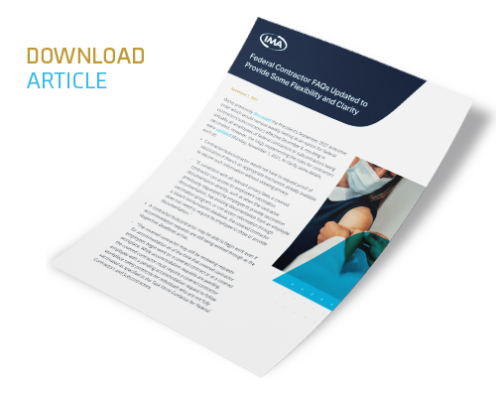We’ve previously discussed the President’s September 2021 executive order which would remove weekly testing as an option for federal contractors/subcontractors effective December 8, resulting in virtually all employees of federal contractors or subcontractors being vaccinated. However, the FAQs implementing the rules for contractors were updated Monday, November 1, 2021, to clarify some details, such as:
- Contractor/subcontractor would not have to request proof of vaccination if there’s an appropriate mechanism already available to secure such information without violating privacy.
- “If, consistent with all relevant privacy laws, a covered contractor can access its employee’s vaccination documentation directly, such as when the contractor previously requested the employee to provide vaccination documentation, has existing documentation from an employee vaccination program, or can access information through a State’s immunization database, the covered contractor does not need to require its employee to show or provide documentation.”
- A contractor/subcontractor may be able to begin work even if accommodation requests are still being worked through as the respective deadlines arrive.
- “The covered contractor may still be reviewing requests for accommodation as of the time that covered contractor employees begin work on a covered contract or at a covered workplace. While accommodation requests are pending, the covered contractor must require a covered contractor employee with a pending accommodation request to follow workplace safety protocols for individuals who are not fully vaccinated as specified in the Task Force Guidance for Federal Contractors and Subcontractors.”
- It’s up to each federal agency how to handle those granted an accommodation, but in most cases they’ll simply require the unvaccinated contractor/subcontractor employee to “follow applicable masking, physical distancing, and testing protocols.” Some agencies may determine those being granted an accommodation would be unsafe to include in a federal contract or site, so the contractor/subcontractor should just be prepared for that possibility.
- Additional clarity is offered about whether and to what extent a “corporate affiliate” with some shared ownership or shared facilities with a covered contractor/subcontractor might also need to follow these rules for some of their own employees.
- Federal agencies will largely defer to contractors/subcontractors on how to deal with refusal to get vaccinated or request accommodation. They encourage these employers to follow their usual written employment policies or collective bargaining agreement for disciplinary procedures to follow, and they provide a framework for how the federal agencies themselves handle those refusing vaccines. Just note the federal agency with which the contractor is working might deny entry to a federal workplace. A portion of this FAQ says this:
- “Guidance for Federal agencies is to utilize an enforcement policy that encourages compliance, including through a limited period of counseling and education, followed by additional disciplinary measures if necessary. Removal occurs only after continued noncompliance. Guidance for Federal agencies is that employees should not be placed on administrative leave while the agency is pursuing an adverse action for refusal to be vaccinated but will be required to follow safety protocols for employees who are not fully vaccinated when reporting to agency worksites.”
